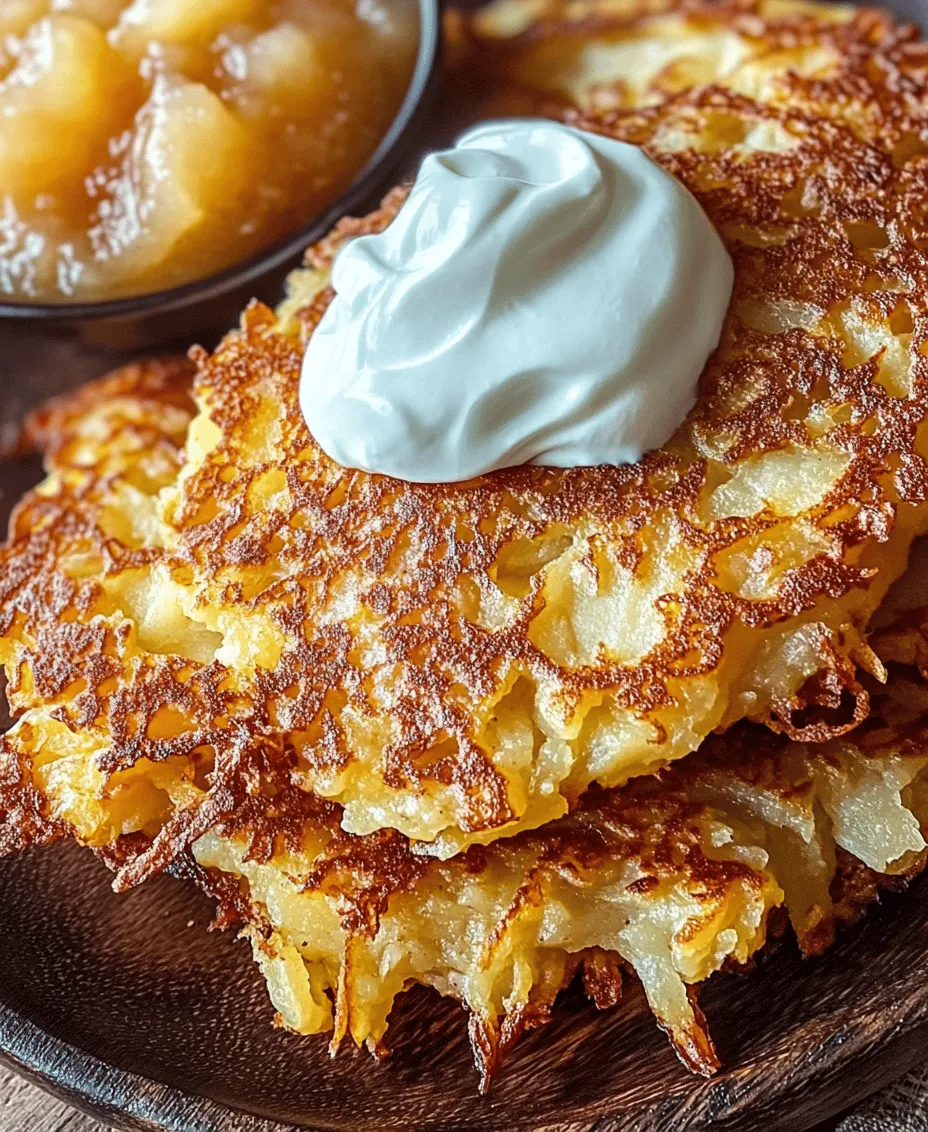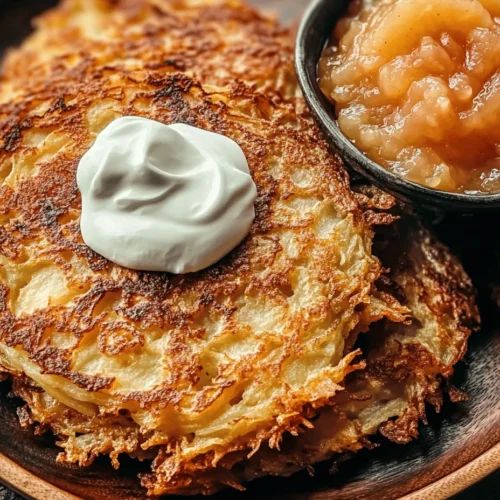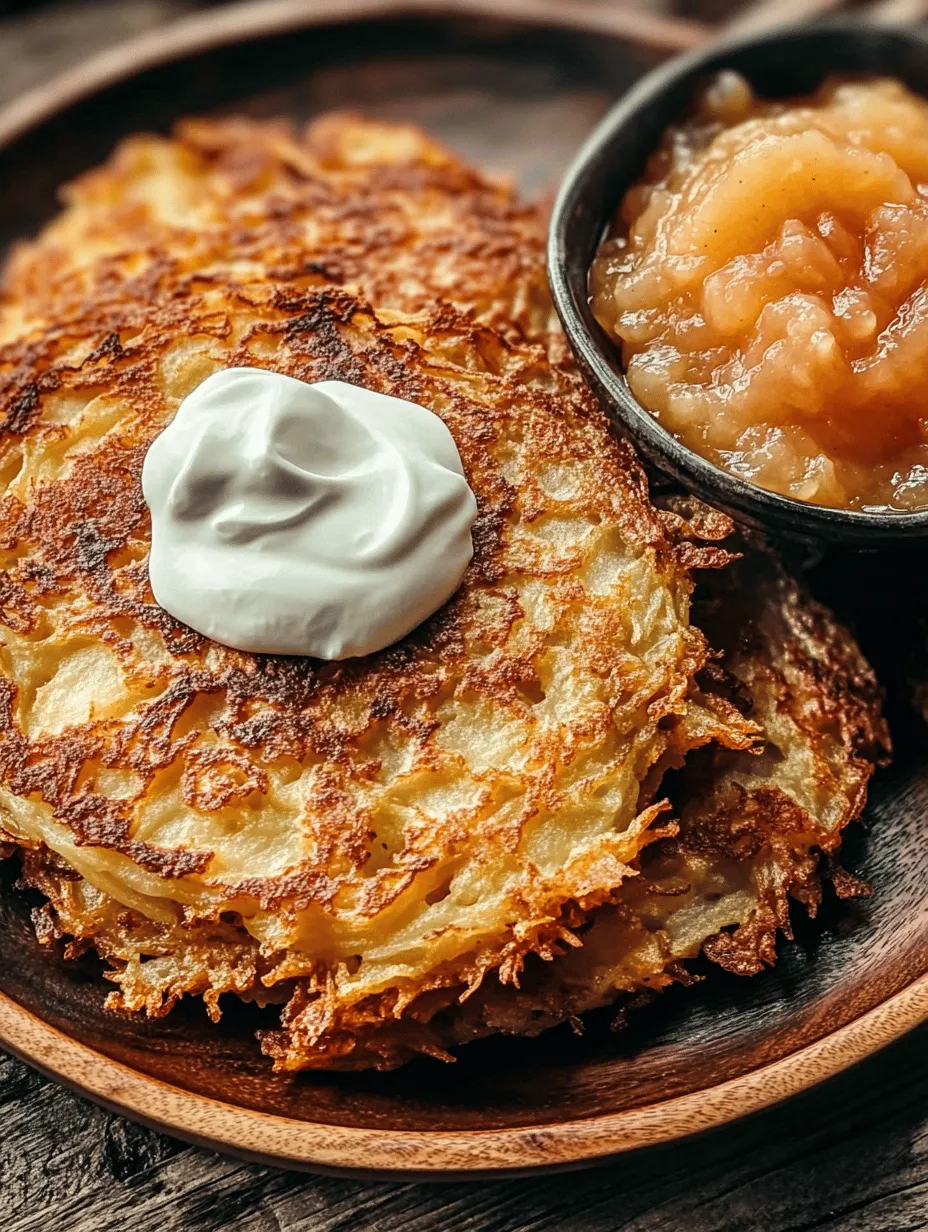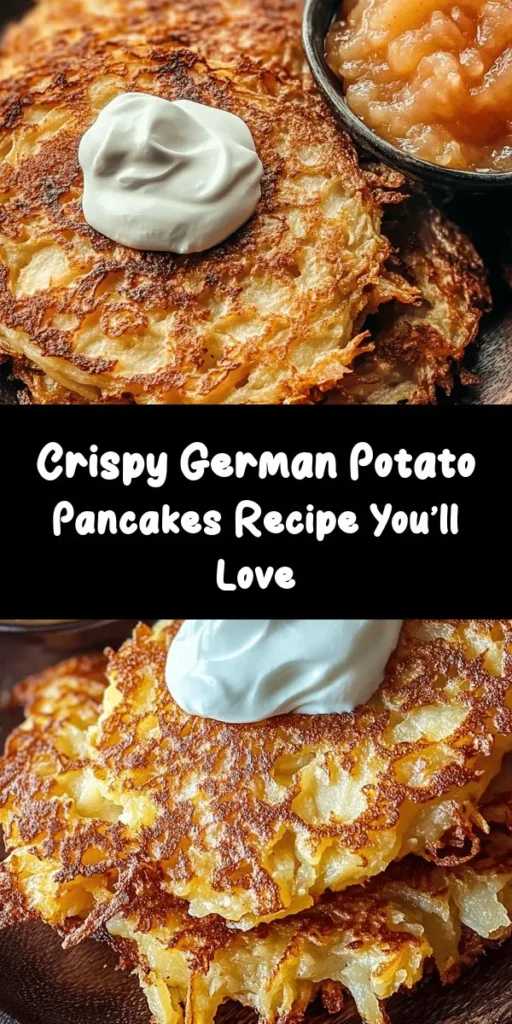Introduction
German cuisine is a treasure trove of hearty, flavorful dishes that have captured the hearts and palates of food lovers around the world. Renowned for its rich flavors, comforting ingredients, and rustic approach to cooking, German food offers an authentic experience that goes beyond mere sustenance. Among the many delightful offerings, one dish stands out for its simplicity and delightful taste: potato pancakes, known in Germany as Reibekuchen. These crispy, golden-brown delights are a beloved staple of traditional German cooking, adored for their versatility and ability to evoke feelings of warmth and nostalgia.
The importance of an authentic recipe cannot be overstated when it comes to German potato pancakes. Each bite is a reflection of the country’s culinary heritage, steeped in history and rich with the flavors of home-cooked meals. As you embark on the journey to create your own authentic German potato pancakes, you will not only indulge in a delicious dish but also connect with the cultural roots that have made this recipe a cherished tradition in Germany.
Understanding the Cultural Significance of Potato Pancakes
Potato pancakes have a storied history in Germany, dating back to the introduction of the potato in the 18th century. Initially met with skepticism, the potato soon became a beloved ingredient, transforming the culinary landscape of Europe. The versatility of the potato allowed for the creation of numerous dishes, with Reibekuchen emerging as a shining example of its potential.
Historically, potato pancakes were a practical solution for utilizing leftover potatoes, allowing households to create a filling meal with minimal resources. Over the years, they transitioned from humble beginnings to a dish served during festivals and special occasions, showcasing their significance in German culture. For example, during the holiday season, especially around Christmas markets, you will find vendors serving freshly made Reibekuchen, often accompanied by applesauce or sour cream. The pancakes symbolize not only comfort food but also the spirit of community and celebration.
Interestingly, different regions in Germany boast their own unique takes on potato pancakes. In the Rhineland, for instance, they are often prepared with grated apples for a hint of sweetness, while in Bavaria, you might find them seasoned with herbs to enhance their flavor profile. Each variation reflects the local ingredients and culinary preferences, illustrating the adaptability of this cherished dish.
Key Ingredients for Authentic German Potato Pancakes
Creating authentic German potato pancakes requires a handful of simple yet pivotal ingredients. Each plays a crucial role in achieving the perfect texture, flavor, and overall quality. Let’s delve deeper into the key ingredients that ensure your Reibekuchen is as authentic and delicious as possible.
Russet Potatoes
The star ingredient of any potato pancake is, of course, the potato itself. For authentic German potato pancakes, russet potatoes are the preferred choice. Known for their high starch content and low moisture, russet potatoes yield a crispier exterior while maintaining a fluffy interior. This unique texture is essential for achieving the perfect bite.
When selecting russet potatoes, look for ones that are firm, with no soft spots or blemishes. Larger potatoes are often easier to work with, as they provide ample flesh for grating. The key is to ensure that you have enough potatoes to create a satisfying batch of pancakes, as they tend to disappear quickly once served.
Onion
Onion plays a pivotal role in enhancing the flavor of the potato pancakes. Its natural sweetness and aromatic properties add depth to the dish, balancing the earthiness of the potatoes. For authentic Reibekuchen, yellow or sweet onions are ideal, as they provide a harmonious blend of flavor without overpowering the dish.
When preparing your onions, finely grate them to ensure they integrate well with the potato mixture. If you prefer a milder flavor, consider soaking the grated onion in cold water for a few minutes to reduce its pungency. This step is particularly beneficial for those who may be sensitive to strong onion flavors.
Eggs and Flour
Eggs and flour are essential binders that help hold the potato mixture together, ensuring your pancakes don’t fall apart during frying. The eggs contribute moisture and richness, while the flour provides structure. For authentic German potato pancakes, a combination of all-purpose flour and a pinch of baking powder is often used to achieve the desired consistency.
When incorporating eggs into the mixture, be sure to use fresh eggs for the best results. The quality of the eggs can significantly impact the flavor and texture of your pancakes. Similarly, when selecting flour, opt for unbleached all-purpose flour to maintain the traditional taste.
Seasonings
Seasonings are the finishing touch that brings all the ingredients together. For authentic potato pancakes, a simple combination of salt and pepper is typically all that’s needed to enhance the natural flavors. Salt helps draw out moisture from the potatoes, intensifying their flavor, while pepper adds a subtle kick. Additionally, a small amount of baking powder can be included to create a lighter texture.
When seasoning your potato mixture, taste as you go to ensure a balanced flavor profile. The goal is to complement the ingredients rather than mask their natural goodness.
Oil for Frying
The choice of oil for frying is crucial, as it not only affects the flavor of the pancakes but also the cooking process. Traditional German potato pancakes are typically fried in vegetable oil or canola oil due to their high smoke points and neutral flavors. These oils allow the pancakes to achieve that crispy, golden-brown exterior without imparting any unwanted taste.
For a more authentic touch, some cooks prefer to use clarified butter or ghee, which adds a rich, buttery flavor to the pancakes. Whichever oil you choose, ensure that it is heated adequately before adding the potato mixture to achieve that coveted crispy texture.
—
As you gather your ingredients and prepare to embark on the delightful journey of making authentic German potato pancakes, remember that each step is an opportunity to connect with a rich culinary tradition. From the selection of russet potatoes to the careful seasoning of your mixture, every detail counts in creating the perfect Reibekuchen—a dish that embodies the comfort and joy of German cuisine.

Step-by-Step Guide to Making Authentic German Potato Pancakes
Preparation Phase
The first step in creating authentic German potato pancakes, or “Reibekuchen,” is selecting and preparing the right potatoes. Opt for starchy potatoes like Russets or Yukon Gold, as they yield the best texture and flavor. Begin by peeling approximately 2 pounds of potatoes. It’s essential to work quickly after peeling, as potatoes can oxidize and turn brown if left exposed to air for too long.
Once peeled, you will need to grate the potatoes. A box grater or a food processor fitted with a grating attachment works perfectly for this task. Grate the potatoes into a large bowl, ensuring that the shreds are uniform in size to cook evenly.
After grating the potatoes, it’s crucial to remove as much moisture as possible. Excess moisture can lead to soggy pancakes that lack the desired crispiness. To achieve this, transfer the grated potatoes to a clean kitchen towel or cheesecloth and twist it tightly to extract the liquid. This step may seem tedious, but it’s vital for achieving that perfect crisp texture that German potato pancakes are renowned for.
Mixing Ingredients
With the grated potatoes prepared, it’s time to mix the ingredients. In a large mixing bowl, combine the grated potatoes with one finely chopped onion, two large eggs, and approximately 1/4 cup of all-purpose flour. The flour acts as a binder, helping the pancakes hold their shape while frying.
Season the mixture generously with salt and pepper; typically, 1 teaspoon of salt and 1/2 teaspoon of pepper works well, but feel free to adjust according to your taste. For an extra flavor boost, you can also add a pinch of nutmeg, which is a traditional touch in many German recipes.
Once all the ingredients are in the bowl, use a fork or your hands to mix them together gently. Be careful not to overmix; you want to maintain some of the texture of the potatoes while ensuring everything is well-combined.
Heating the Oil
To achieve perfectly crispy potato pancakes, heating the oil to the right temperature is crucial. In a large skillet or frying pan, pour in about 1/4 inch of vegetable oil or clarified butter. Heat the oil over medium-high heat until it shimmers—this indicates that it is hot enough for frying. A good test is to drop a small spoonful of the potato mixture into the pan; if it sizzles immediately, the oil is ready.
Avoid overcrowding the pan, as this can lower the oil temperature and result in greasy pancakes instead of crispy ones. Depending on the size of your skillet, you may need to cook in batches.
Frying the Pancakes
When the oil is hot, scoop approximately 1/4 cup of the potato mixture and carefully drop it into the skillet. Flatten each mound slightly with the back of a spatula to form a pancake shape. Fry for about 4-5 minutes on one side until golden brown. Carefully check the underside before flipping; it should be a deep golden color.
Once the first side is browned, gently flip the pancakes using a spatula and cook for an additional 4-5 minutes on the other side. The goal is to achieve a uniform golden-brown color while ensuring the inside is cooked through.
Draining Excess Oil
After frying, it’s essential to drain the excess oil to keep the pancakes from becoming greasy. Transfer the cooked pancakes to a plate lined with paper towels, which will absorb any leftover oil. You can keep the pancakes warm in a low oven (around 200°F or 93°C) while you finish frying the rest of the batch.
Serving Suggestions for German Potato Pancakes
German potato pancakes are traditionally served with a few classic accompaniments that enhance their flavor. The most popular pairing is applesauce, which provides a sweet contrast to the savory pancakes. A dollop of sour cream is another traditional topping, adding a creamy richness that complements the crispy texture of the pancakes beautifully.
For those looking to put a modern twist on this classic dish, consider trying the following variations:
– Herb Infusion: Mix in fresh herbs such as chives, parsley, or dill into the batter for a burst of freshness.
– Cheese Lovers: Add grated cheese, such as cheddar or gouda, to the mixture for a rich, savory flavor.
– Spicy Kick: Incorporate some finely chopped jalapeños or a sprinkle of cayenne pepper for those who enjoy a bit of heat.
– Serving with a Salad: Pair the pancakes with a light salad of mixed greens, cherry tomatoes, and a vinaigrette for a balanced meal.
Nutritional Information and Dietary Considerations
When considering the nutritional profile of German potato pancakes, they are primarily made from potatoes, which are a good source of carbohydrates and provide energy. Each pancake can contain around 150-200 calories, depending on the size and the amount of oil used for frying. They also provide a small amount of protein and fiber.
If you’re looking to make this dish healthier or accommodate dietary restrictions, here are some suggestions:
– Gluten-Free Version: Substitute the all-purpose flour with a gluten-free flour blend or almond flour to make gluten-free potato pancakes.
– Lower Fat Content: Instead of frying, consider baking the pancakes on a parchment-lined baking sheet. Brush them lightly with oil and bake at 450°F (232°C) for about 20 minutes, flipping halfway through.
– Vegetable Boost: Enhance the nutritional value by adding grated carrots, zucchini, or even spinach to the potato mixture.
Conclusion
Authentic German potato pancakes are not just a dish; they are a delightful experience that connects you to German culture and tradition. With their crispy exterior and tender interior, these pancakes are a comfort food that can be enjoyed at any time of the day—whether as a main dish, a side, or even a snack.
By following this detailed recipe and taking the time to prepare each component carefully, you will create a dish that is not only delicious but also resonates with the heart of German cuisine. So, gather your ingredients, roll up your sleeves, and embark on the delicious journey of making your own homemade German potato pancakes. Enjoy this traditional recipe that brings a taste of Germany right to your kitchen, and share it with family and friends for a truly memorable meal.



